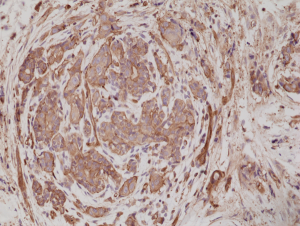anti-Alpha Actinin-4 (human) Rabbit Monoclonal (RM287)
| Code | Size | Price |
|---|
| REV-31-1171-00-R100 | 100 ul | £455.00 |
Quantity:
Prices exclude any Taxes / VAT
Overview
Antibody Isotype: Rabbit IgG
Antibody Clonality: Recombinant Antibody
Antibody Clone: RM287
Regulatory Status: RUO
Target Species: Human
Applications:
- Immunohistochemistry (IHC)
- Western Blot (WB)
Shipping:
Blue Ice
Storage:
+4°C
Images
Documents
Further Information
Alternate Names/Synonyms:
Non-muscle alpha-Actinin 4
Concentration:
N/A
EClass:
32160000
Form (Short):
liquid
Formulation:
Liquid. 50% Glycerol/PBS with 1% BSA and 0.09% sodium azide.
Handling Advice:
Avoid freeze/thaw cycles.
Immunogen:
A peptide corresponding to the N-terminus of human alpha-Actinin-4
.
Long Description:
Recombinant Antibody. This antibody reacts to human alpha-Actinin-4. Applications: WB, IHC. Source: Rabbit. Liquid. 50% Glycerol/PBS with 1% BSA and 0.09% sodium azide. α-Actinin 4 is an actin-bundling protein of ~100kDa that is associated with cell motility, endocytosis and cancer invasion. The α-actinin family comprises two non-muscle isoforms (α-actinin-1 and -4) and two skeletal muscle isoforms (α-actinin-2 and -3), with α-actinin-2 being also expressed in cardiac muscle. While α-actinin-4 is almost ubiquitously expressed, particularly high concentrations are found in glomeruli. On the subcellular level it is associated with actin stress fibers, but in certain cells it also localizes to the nucleus. Mutations in the α-actinin-4 gene cause an autosomal-dominant form of familial focal segmental glomerulosclerosis (FSGS), which is thought to result from a defect in glomerular podocyte function. A point mutation in the α-actinin-4 gene was found to generate an antigenic peptide that is recognized by autologous cytolytic T lymphocytes (CTL) on a human lung carcinoma. α-Actinin-4 interacts with a variety of proteins, including the ring finger protein BERP, the PDZ-LIM protein CLP-36, the hemidesmosomal and cell-cell contact protein BP180, and the tight junction protein MAGI-1. Moreover, α-actinin-4 forms a ternary complex with Ca2+/Calmodulin-dependent protein kinase II and densin-180, a protein of postsynaptic densities in CNS neurons. Ca2+-dependent association of α-actinin-4 with E3KARP is required for Ca2+-dependent inhibition of the Na+/H+ exchanger 3 (NHE3).
NCBI, Uniprot Number:
O43707?
Package Type:
Vial
Product Description:
alpha-Actinin 4 is an actin-bundling protein of ~100kDa that is associated with cell motility, endocytosis and cancer invasion. The alpha-actinin family comprises two non-muscle isoforms (alpha-actinin-1 and -4) and two skeletal muscle isoforms (alpha-actinin-2 and -3), with alpha-actinin-2 being also expressed in cardiac muscle. While alpha-actinin-4 is almost ubiquitously expressed, particularly high concentrations are found in glomeruli. On the subcellular level it is associated with actin stress fibers, but in certain cells it also localizes to the nucleus. Mutations in the alpha-actinin-4 gene cause an autosomal-dominant form of familial focal segmental glomerulosclerosis (FSGS), which is thought to result from a defect in glomerular podocyte function. A point mutation in the alpha-actinin-4 gene was found to generate an antigenic peptide that is recognized by autologous cytolytic T lymphocytes (CTL) on a human lung carcinoma. alpha-Actinin-4 interacts with a variety of proteins, including the ring finger protein BERP, the PDZ-LIM protein CLP-36, the hemidesmosomal and cell-cell contact protein BP180, and the tight junction protein MAGI-1. Moreover, alpha-actinin-4 forms a ternary complex with Ca2+/Calmodulin-dependent protein kinase II and densin-180, a protein of postsynaptic densities in CNS neurons. Ca2+-dependent association of alpha-actinin-4 with E3KARP is required for Ca2+-dependent inhibition of the Na+/H+ exchanger 3 (NHE3).
Purity:
Protein A purified.
Source / Host:
Rabbit
Specificity:
This antibody reacts to human alpha-Actinin-4.
Transportation:
Non-hazardous
UNSPSC Category:
Primary Antibodies
UNSPSC Number:
12352203
Use & Stability:
Stable for at least 1 year after receipt when stored at -20°C.



